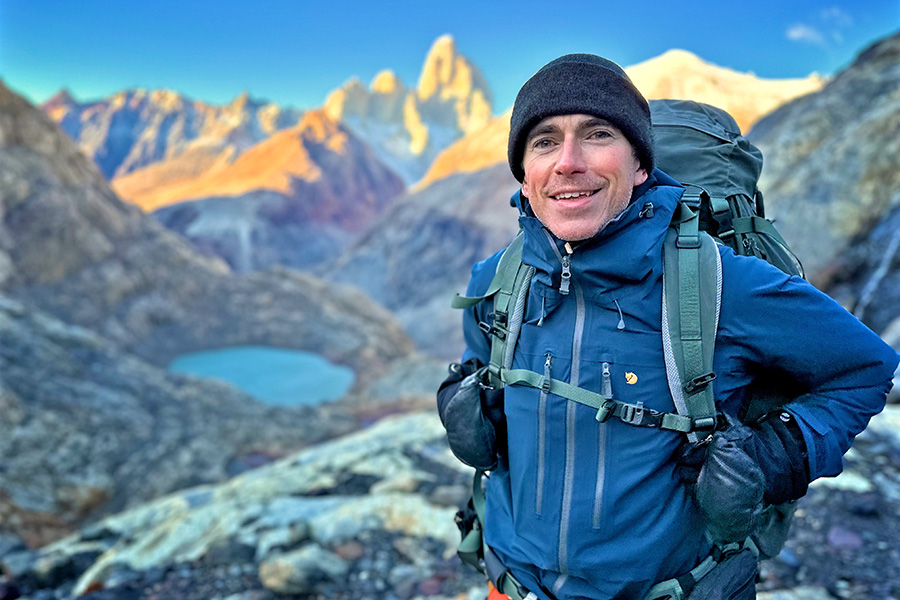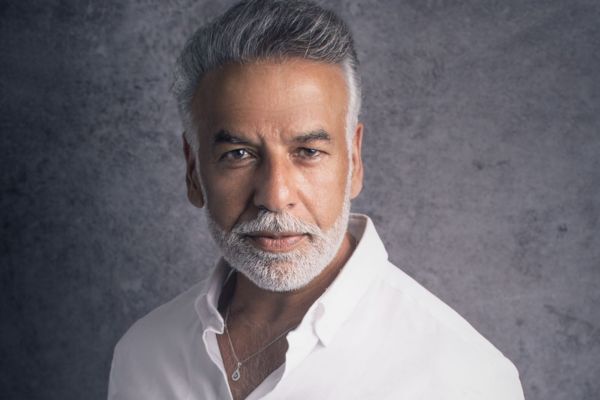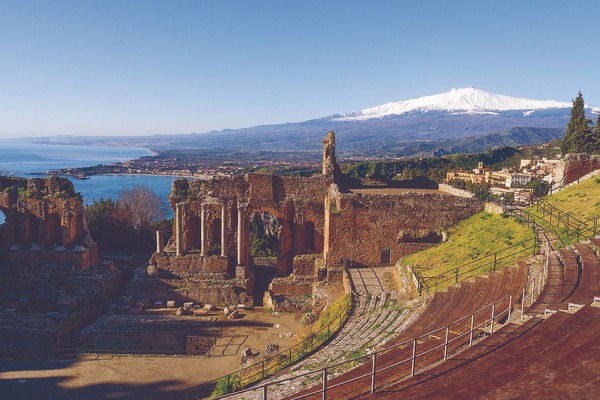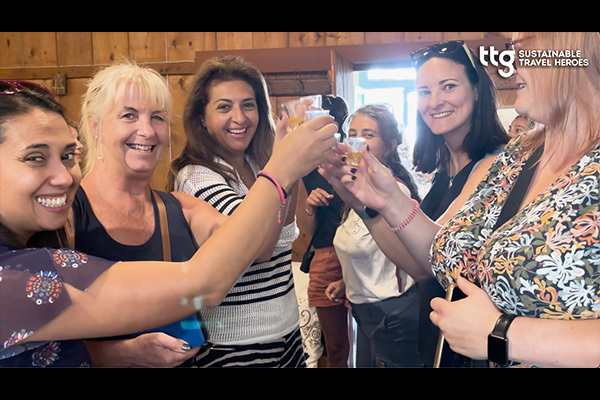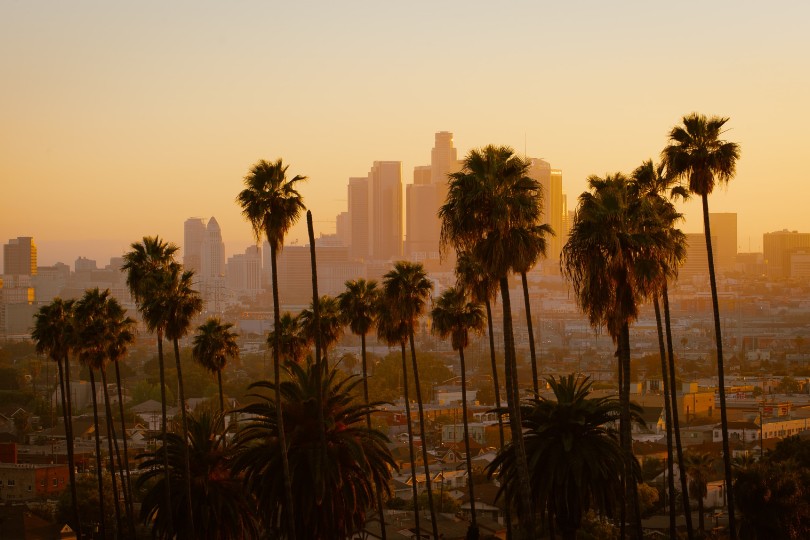Simon Reeve: ‘The wilderness needs tourism to help it survive’
The travel presenter is back on our TV screens, bringing a brilliantly exotic feel to Sunday nights, with Wilderness. Here he shares his tourism manifesto for the wild, his stand-out moments of the series and that time he was nearly upstaged by the ‘other Simon Reeve’.

For his latest offering, Simon Reeve has pulled together a veritable colour palette of adventurous travel experiences. In four episodes screened on BBC2, he brings us the green of the rainforest in the Congo, the yellow of the Kalahari desert; the white of the Patagonian mountains; and the blue of the Coral Triangle sea.
Reeve covers each location with his trademark presenting style; awe at the wildlife and landscapes, genuine interest in the people he encounters, and never shying away from asking vital questions about the future of these places and their impact on the world, leading him to label Wilderness his ‘most important series’ yet.
Is there any wilderness left?
There’s nowhere that’s untouched by humanity. There are plastic particles at the bottom of the ocean and on top of our highest mountain. We met tribespeople deep in the Congo Rainforest wearing football shirts; people in the remote Kalahari using two-decade old Nokia phones as portable music players. It is an indicator of how connected the planet is, and not in the best of ways in truth. But it’s an aspect of life, we not going to ignore it, and ask anyone who’s wearing a Leeds United top to step out of the way. For Wilderness, we went for areas where the impact of modern and industrial humanity is low, where nature still makes the rules.
Is the wilderness at risk from tourism?
Not the wilderness… obviously there are parts of the world where you can’t move for people trying to get a selfie. But the wilderness is still pretty empty – but only of eco-tourists. It’s not empty of people eyeing it up as a place to strip, mine, farm and ranch. Travel and tourism can give people an economic incentive to look after these wild places, and it is something we explore in the programme. Tourism, done responsibly and sustainably, is still a viable alternative, because we’ve got to protect these areas if we are to have any hope of combating climate change and protecting wildlife biodiversity.
Shouldn’t we leave these areas alone, rather than show them on TV?
We don’t leave them alone, they are being nibbled away around the edges, they are under threat, from humans encroaching into them. We have to learn about our planet, understand and respect it, and start loving it. It’s just about the most important series I’ve ever made because we are highlighting areas of the planet that are fundamentally connected to us, they govern and help to shape a weather system and the climate on this planet that affects us all, and unless we care about these areas, we will ultimately lose them. We’re not shying away from the fact there is logging around the edge of the Congo Rainforest. It isn’t just a glossy travelogue, hopefully we are showing a bit of light and shade in the programme.
If people want to view Wilderness as an opportunity to learn about somewhere they might go, I think that’s almost always a positive thing. They need Western wealthy travellers turning up and putting some money into the local economy to protect and preserve these places.
How can we help promote tourism in the wilderness?
It needs to be led by the people who live in these places, the Indigenous people in particular, who are often overlooked and ignored, particularly by conservationists. I’d encourage them to set up small businesses to protect the places they care about and know far better than any outsider. I’m more in favour of them becoming the travel operators than Europeans, and again that’s something we talk about in the Okavango Delta, where there’s definitely a move towards that. That way tourists can still have the experiences but it’s not outsiders and wealthy white South Africans who are running those lucrative businesses.
How far are we from developing tourism infrastructure in these places?
Tourism is a long way away in the depths of the Congo, but some of the wilderness areas we visited, people do reach in some form or other. The Okavango Delta, one of the largest, greatest oases on planet earth, has high-end tourism, which helps to sustain local communities. In the depths of the Congo, people would welcome wealthy foreigners turning up on eco-tours, it’s a bit of a way off, but I’m sure there’d be some ambitious and inspiring Congelese travel operators, if you look hard enough. Unfortunately, at the moment, it’s not very democratic, it does take a bit of dosh to get into these sorts of places, but hopefully people will be inspired to experience the wilderness, whether it’s over there, or closer to home.
Did it feel risky going to these places?
I knew it would be physically challenging and that was daunting – I ran around Devon wearing a 15kg weight vest to train for this series. Yes, there were some moments of fear and panic. We were filming with whale sharks, the size of a small single decker bus, off the coast of New Guinea. They don’t like chomping on human beings so they should be a safe creature to be in proximity to, but we were with an amazing local fisherman who was feeding them buckets of tiny fish. They were gorging on what he was chucking in the water, and behaving unpredictably. They were bloody great creatures, whirling and turning on a dime, and swimming in the water with them suddenly felt like being on a skid pan while a bus was doing donuts. There was a moment there when I felt this was not the safest thing to do. One of the whale sharks collided with me and it was like getting hit by a ton of concrete. It smashed into my leg and I had a scar across my leg for a month and a half, which of course I was very discreet about, I hardly showed anyone…
Is it easy to insure you for these trips?
I don’t get conventional insurance, there has to be a lot of sign-off from insurance companies, and there’ll only do that if they think you have a degree of experience that means you’re not going to lose it in situations where things go wrong. I’ve had a lot of medical training and been in a lot of conflict zones and that builds up a stock of experiences where people are willing to take a punt on you going to remote places where the unknown can happen, and in the health and safety conscious world we live in now, that’s no small thing.
We take the risks seriously, we all want to come home again, so we mitigate risk wherever we can, and we are genuinely careful. I have this nutty obsession with everyone wearing seatbelts when we’re on the road. That is still what’s most likely to cause us catastrophe when we’re on a journey.
Do you encounter much bureaucracy making a series like this?
Of course, there is masses of bureaucracy that’s very painful and infuriating. Governments do sometimes try and control what we’re doing, to a lesser or greater degree. Navigating that takes decades of experience and plenty of negotiation. The biggest restriction was when we travelled around the Indian Ocean and the Australian government at one point seriously said, “well we’ve got a presenter called Simon Reeve, why can’t he present that part of the programme”, and explaining to them that would be a bit weird led to some ridiculous conversations.
What was your stand-out moment from the series?
In the heart of the Kalahari, I was with two master San trackers and hunters and had a small can of pepper spray to ward off any lions. We were crawling along the ground as we were trying to get up close to a herd of wildebeest and it sends a proper shiver down the spine to think I’ve done that. It felt as primal as anything I’ve ever done – then one of them only went and missed the shot, and the herd scattered. We really tried to capture that in a way that will resonate with people. I hope people will recognise and respect the Sans’ existence a little more as a result.
There were so many moments like that… we were in Patagonia and we spotted a tiny little puma cub on the ground through binoculars, and that was incredible to see a young big cat in the wild. A group of pumas tracked in front of us on a hill, and we saw a giant female puma silhouetted against the sky, and she looked so majestic and extraordinary, that honestly, I would have offered myself up as lunch to her.
How can we find wilderness without going to the Congo?
Wilderness is a mindset as much as an actual place – we can all find the wild close to where we live. Obviously, I’ve been to the far reaches of the planet to look for it, but it is on these islands. It’s an outlook in life we need to incorporate more into our existence, because life can become far too bloody samey and safe, and we need to have our senses tweaked and teased; we need to feel what it’s like to go round a new corner and explore. We all need a more profound connection with Mother Nature – children need it, adults need it – and I say that as someone who grew up in Hounslow!
What did you learn by making this series?
I learnt there is still a wild planet out there, and it’s huge, enormous, beautiful and life-affirming to be among it. I found it very moving to have that that sense of being in raw nature – we were camping high up in the Andes and I had to go to the loo early in the morning. We were on a smallish ridge, tents dotted around and obviously I wanted to get away from my team mates. So I went to the edge of the ridge, bog roll in hand – where I was confronted by this incredible sight of dark mountains to the horizon, illuminated by moonlight. I was transfixed by this night-time view of the Andes mountains – it will live with me for the rest of my life, as a moment of utter rawness in the wild on planet earth. And for that alone, I would’ve done the entire series for.
